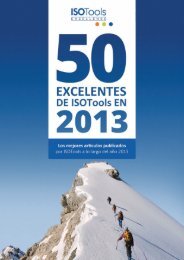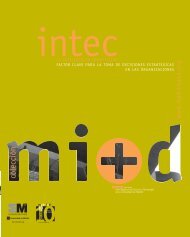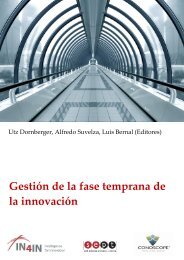The Global Innovation Index 2012
The Global Innovation Index 2012
The Global Innovation Index 2012
Create successful ePaper yourself
Turn your PDF publications into a flip-book with our unique Google optimized e-Paper software.
92<br />
THE GLOBAL INNOVATION INDEX <strong>2012</strong> 3: <strong>The</strong> Case of Saudi Arabia<br />
and the companies of the Offset<br />
Program, particularly in the field<br />
of electronics, are now carrying<br />
out important technology-transfer<br />
and indigenization activities. Saudi<br />
Aramco has worked on transfer<br />
and indigenization of technology<br />
in the oil industry, establishing<br />
two R&D centres for that purpose.<br />
SABIC also made similar efforts<br />
in the petrochemical technology<br />
transfer, expanding its Industrial<br />
Complex for R&D in Riyadh and<br />
locating two upstream R&D centres<br />
at the science parks of two major<br />
Saudi universities. <strong>The</strong> company<br />
is building a plastics application<br />
development centre at the Riyadh<br />
Techno Valley research complex<br />
inside the King Saud University<br />
(KSU) campus. Saudi International<br />
Petrochemical Company (Sipchem),<br />
which was established in 1999, is<br />
building now a corporate Product<br />
& Application Development Centre<br />
(PADC) at DTV of KFUPM, which<br />
will be operational in mid <strong>2012</strong>. <strong>The</strong><br />
Saudi Arabian Amiantit Company,<br />
which was established in 1968 and<br />
developed into a major diversified<br />
industrial group with operations<br />
spanning the globe, is now establishing<br />
a research centre at DTV.<br />
<strong>The</strong> Saudi national ecosystem and<br />
academia-industry links<br />
While implementing the 8th Plan<br />
focused on the knowledge production<br />
and dissemination challenges,<br />
the 9th Plan recognized different difficulties<br />
with regard to indigenization<br />
of knowledge and transforming<br />
knowledge into products in Saudi<br />
Arabia. <strong>The</strong>se included two intertwined<br />
dimensions: (1) directing the<br />
country’s investment in R&D and<br />
innovation towards areas important<br />
to the national economy and (2)<br />
the needs for developing effective<br />
academia-enterprise innovation<br />
linkages.<br />
To address the relative imbalance<br />
among basic and applied<br />
research, development, and innovation,<br />
NSTP funding for research in<br />
universities came under contract<br />
with the production and service<br />
sectors, thus avoiding being geared<br />
merely towards academic publication<br />
and career promotion. <strong>The</strong><br />
academia-enterprise innovation<br />
linkages dimension encompasses<br />
several important enablers, including<br />
intermediary institutions that<br />
interface education and R&D with<br />
production and services sectors.<br />
<strong>The</strong>se intermediary institutions also<br />
play an important role in transferring<br />
R&D results to production<br />
lines and services and transforming<br />
knowledge into wealth. In addition<br />
to research parks at the campuses<br />
of major Saudi universities, both<br />
quantitative and qualitative expansion<br />
of intermediary institutions has<br />
occurred in the last few years. An<br />
NSTP programme was launched<br />
in 2009 with the aim of creating<br />
a chain of cooperative technology<br />
innovation centres (TICs) between<br />
universities and the private industrial<br />
sector (both local and global) at<br />
leading universities in the Kingdom.<br />
With a similar approach, the<br />
World Bank’s <strong>Innovation</strong> Policy Guide<br />
for Developing Countries emphasizes<br />
the development of an innovation<br />
scheme to provide public-private<br />
partnerships and industry-university<br />
collaboration by focusing on funding<br />
the seed stage of potential<br />
niche research projects as a possible<br />
innovation path for Saudi Arabia.5<br />
In 2011, TICs were established<br />
at three major Saudi universities:<br />
KFUPM, KSU, and King Abdulaziz<br />
University (KAU). <strong>The</strong> centres are<br />
geared towards developing advanced<br />
technologies that secure demanded<br />
advanced products and give new<br />
resources to generate wealth and<br />
work opportunities for citizens.<br />
<strong>The</strong>y are also driven by industrially<br />
relevant problems. Types of<br />
university-industry cooperation<br />
include joint funding, sharing of<br />
resources, and in-kind support. <strong>The</strong><br />
activities of these centres involve<br />
education and training programmes<br />
including, but not limited to, a PhD<br />
programme that complements the<br />
research programmes and builds<br />
engagement, innovation, and R&D<br />
capacity with industrial members.<br />
<strong>The</strong>se centres are also strongly<br />
encouraged to extend their activities<br />
in order to involve undergraduates<br />
in their research. This is part of the<br />
efforts for developing Saudi human<br />
resources training programmes<br />
attuned to modern knowledge and<br />
technology.<br />
Further important dimensions<br />
of the NSTP are motivating Saudi<br />
research universities and enterprise<br />
sectors to expand partnerships in<br />
increasing knowledge production<br />
nationally and to provide<br />
more incentives for joint ventures<br />
and R&D-related FDI investment<br />
in knowledge transfer and<br />
indigenization.<br />
Encouraging the commercialization<br />
of research and promoting<br />
technology transfer from universities<br />
and research institutes are two of<br />
the main objectives of the National<br />
Policy for Technology Business<br />
Incubation (NPTBI). <strong>The</strong> King<br />
Abdulaziz City for Science and<br />
Technology created the BADIR<br />
programme to advance that policy<br />
to meet some of the NSTP objectives.<br />
<strong>The</strong> BADIR—which means<br />
‘initiate’—programme is mandated<br />
to support a network of five national<br />
technology-focused incubators<br />
that assist emerging-technology<br />
companies with specialist accommodations.<br />
BADIR incubators<br />
will focus mainly on the priority






